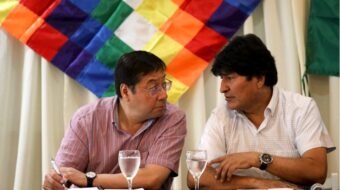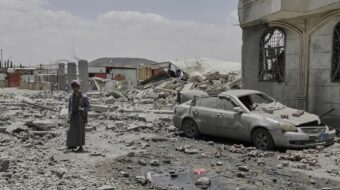
RIVER FOREST, Ill. — After 20 years of one-party rule and 17 years after the end of a brutal civil war, a seismic political shift is shaping up in El Salvador.
Recent polls indicate Mauricio Funes with the Farabundo Marti National Liberation Front (FMLN) has a substantial double-digit lead over the ruling right-wing Nationalist Republican Alliance (ARENA) party nominee Rodrigo Avila, in El Salvador’s presidential elections March 15.
Local/global connections
Dr. Christina Perez is a professor at Dominican University and director of its Women and Gender program. Dominican is a Catholic university located here just west of Chicago –and a world away from El Salvador.
But Perez will be closing the gap between these two worlds. She is leading a study abroad course to El Salvador with a group of 15 students and five faculty members. All except one are women. They plan to monitor the Salvadoran elections.
Perez and her students took time to speak with the World about their upcoming travel.
The objective of the course is to promote free and fair elections and to learn about the Salvadoran life with a focus on women, Perez said.
Economics and politics
From the 1980s to today privatization policies (also known as neoliberal economic policies) backed by Washington grew in El Salvador.
More recently, El Salvador was part of the Central American Free Trade Agreement, signed by former President Bush, and opposed by U.S. and Central American unions and other groups because “free trade” agreements undermine labor standards, jobs, wages and environmental laws for the benefit of corporate profits.
“El Salvador is one of the most neoliberal countries in Latin America and we’re trying to understand how those policies affect the country,” Perez said. “We want to understand the impact of macro level economic policies and how they play out on El Salvadorans, the majority of whom are poor.”
Ashley Watkins, 20, visited El Salvador in 2008 with Perez during a course that examined globalization and neoliberalism and how such policies affect community development, health care and building infrastructure.
“It will be interesting to see democracy in action,” said Watkins.
Voting fraud is a real problem in El Salvador and people are coerced into voting against their own interests, she said.
“But today people feel empowered to vote and want to create change.”
Roots of civil war
Perez pointed out that El Salvador’s election lines up two contending forces who fought each other in a civil war, the roots of which have never fully been addressed.
“El Salvador struggles with grave serious economic inequalities. Political violence has been replaced with gang violence, which came directly out of the civil war,” Perez said.
According to recent data by the World Bank, 37 percent of Salvadorans live in poverty. The Salvadoran economy has become the primary issue in the 2009 elections as a majority of families suffer due to high costs of food and basic services combined with soaring unemployment rates.
El Salvador is one of the most violent countries in the Western Hemisphere, with an average of 10 murders committed daily and a notorious presence of violent street gangs involved in extortion and the drug trade.
In October 1980, four leftist groups including the Communist Party of El Salvador formed the FMLN, which became a popular guerilla front against the ruling elite. Under President Ronald Reagan, Washington sent $6 billion in aid to the Salvadoran government whose army and paramilitary death squads (known as the Contras) were responsible for heinous crimes. Some 75,000 people were killed. It’s known as one of the largest Cold War interventions by the United States in the 1980s. In the name of stopping the spread of “communism,” right-wing forces targeted political dissidents, trade unionists, religious leaders and human rights workers.
Among one of the most notorious acts of the right-wing included the massacre of at least 1,000 people in the village of El Mozote in 1981 and the assassination of Archbishop Oscar Romero in 1980.
The conservative pro-business ARENA party formed in the 1980s by an infamous death squad commander has held executive power since 1989. Over the years, successive ARENA administrations have maintained close ties with U.S. administrations and have been the main proponent of neoliberal economic policies.
After peace accords were signed in 1992, all FMLN units were demobilized and the organization became a legal party, becoming one of the two major parties in El Salvador.
Helping democracy, transparency
“We are not going to campaign for a political party. We’re not the ones to say who should win. That is not our aim. It is up to the Salvadoran people to decide who will win,” Perez said
“But having international observers and monitors of the election does offer transparency and security in a moral sense. It helps build trust and support for the democratic infrastructure.”
In past elections, and according to Perez, even today, there is a lot of intimidation especially toward FMLN supporters.
“There is still a lot of fear and uncertainty about the democratic process. People are afraid to vote for the FMLN” because of the coercion from the government, she said. “And this dark reality has historically been supported and funded by Washington.”
FMLN surges
In the 2008 municipal and legislative elections, the FMLN became the predominant party in the National Assembly where its deputies now outnumber ARENA’s 35 to 32. The FMLN also increased the number of towns and cities it will govern by more than 50 percent, to a total of 90 municipalities.
Critics charge ARENA has long been mired in crime and corruption and supports measures detrimental to the majority of the El Salvador’s struggling poor. Avila, ARENA’s presidential candidate, is a private security mogul and former director of the National Civil Police. ARENA favors privatizing social services and public utilities like electricity and water.
Mauricio Funes, FMLN’s presidential nominee is a well-known television journalist who has been highly critical of the government and leads a broad coalition of forces against the ARENA party.
El Salvador’s change
Caroline Golko, 19, said she is obsessed with politics and can’t wait to see how the election results impact the people and problems in El Salvador. Golko said she thinks the Obama election has inspired voters worldwide including El Salvador.
“Maybe because of the Obama election more people in El Salvador will come out to vote for change in their election,” Golko said.
Watkins also said the Obama election may have an impact. “I know nations can make real history when people vote for it.”
Watkins said she hopes the new president of El Salvador will work with the Obama administration to make reforms, including on CAFTA, so people’s lives can be improved.









